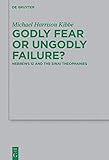Godly fear or ungodly failure? : Hebrews 12 and the Sinai theophanies / Michael Kibbe.
Material type: TextSeries: Beihefte zur Zeitschrift für die neutestamentliche Wissenschaft und die Kunde der älteren Kirche ; Beiheft 216.Publisher: Berlin ; Boston : Walter de Gruyter GmbH, [2016]Description: 1 online resource (xxi, 283 pages)Content type:
TextSeries: Beihefte zur Zeitschrift für die neutestamentliche Wissenschaft und die Kunde der älteren Kirche ; Beiheft 216.Publisher: Berlin ; Boston : Walter de Gruyter GmbH, [2016]Description: 1 online resource (xxi, 283 pages)Content type: - 9783110422597
- 311042259X
- 9783110422764
- 311042276X
- Bible. Hebrews, XII, 18-29 -- Criticism, interpretation, etc
- Bible. Exodus, XIX-XX -- Criticism, interpretation, etc
- Bible. Deuteronomy, IV-V -- Criticism, interpretation, etc
- Bible. Hebrews, XII, 18-29
- Fear -- Biblical teaching
- Failure (Psychology) -- Biblical teaching
- Theophanies in the Bible
- Peur -- Enseignement biblique
- Échec -- Enseignement biblique
- Théophanies dans la Bible
- RELIGION -- Biblical Studies -- New Testament
- RELIGION -- Biblical Studies -- Paul's Letters
- Theophanies in the Bible
- Failure (Psychology) -- Biblical teaching
- Fear -- Biblical teaching
- 227/.8706 23
- BS2775.52 .K53 2016
- online - EBSCO
- BC 7360
| Item type | Current library | Call number | URL | Status | Notes | Barcode | |
|---|---|---|---|---|---|---|---|
 eBook
eBook
|
Biblioteca "Angelicum" Pont. Univ. S.Tommaso d'Aquino Nuvola online | online - EBSCO (Browse shelf(Opens below)) | Online access | Not for loan (Accesso limitato) | Accesso per gli utenti autorizzati / Access for authorized users | (ebsco)1239196 |
Browsing Biblioteca "Angelicum" Pont. Univ. S.Tommaso d'Aquino shelves, Shelving location: Nuvola online Close shelf browser (Hides shelf browser)
Includes bibliographical references and index.
Online resource; title from digital title page (viewed on June 13, 2019).
Frontmatter -- Abstract -- Contents -- Acknowledgements -- List of Abbreviations -- 1. Moses feared and Israel Fled: The Sinai Theophany According to Hebrews -- 2. Israel's Response at Sinai in Exodus -- 3. Israel's response at Sinai (Horeb) in Deuteronomy -- 4. Sinai in the Second Temple Period -- 5. Exodus, Deuteronomy, and Hebrews -- 6. A High Priestly Son and the Siblings Who Follow Him: Zion in Hebrews -- 7. The Calf and the Covenant: Hebrews 12:18-29 -- 8. Conclusion -- Bibliography -- Index of Ancient Texts
A cursory glance at Hebrews' critique of Israel's fear at Sinai in Heb 12:18-29 suggests that the author has misunderstood or manipulated his sources. In the Pentateuch, the appointment of Moses as Israel's mediator receives explicit approval (Exod 19:9; Deut 5:28), while Heb 12:25 labels their request for mediation a "refusal" to heed the word of God. This book argues that Hebrews' use of the Sinai narratives resides on a complex trajectory established by four points: the Sinai covenant according to Exodus, the reenactment of that covenant according to Deuteronomy, the call for a NEW covenant according to Jeremiah, and the present reality of that covenant established by God and mediated by Jesus Christ. The basis for Hebrews' critique arises from its insight that while Israel's request established covenant-from-a-distance, Jesus demonstrates that true covenant mediation brings two parties into a single space. The purpose for Hebrews critique lies in its summons to Zion, the mountain on which Jesus sits at the right hand of God as the high priestly mediator of the new covenant.
In English.









